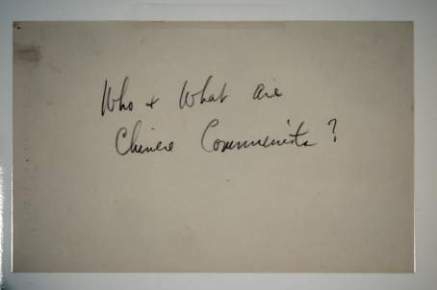This army is the hope of China and Asia — Agnes Smedley, a war correspondent from the US

Smedley's handwriting: "Who & What are Chinese Communists?"
In the library of Arizona State University, one may see the handwriting of the renowned American journalist Agnes Smedley — "Who & What are Chinese Communists?" It is precisely this question that prompted Ms. Smedley, a writer, journalist, revolutionist, advocate for women's rights and internationalist, to come to China in late 1928 and spend 12 years in the country. Her legendary life was thus closely connected with the Chinese revolution.
In Shanghai, Ms. Smedley witnessed the Japanese invasion, and saw how the CPC and the Red Army took the lead in calling for an end to the civil war and rallying the awakening Chinese people to resist invasion. In Xi'an, supported by Zhang Xueliang, she made English broadcasts about the developments and negotiations concerning the Xi'an Incident every day, and about the efforts of Zhou Enlai and other CPC representatives to make new progress in promoting solidarity. Her broadcasts became the only source of information for the public to learn what was really going on. Out of profound sympathy for the Chinese revolution, she yearned to get closer to Yan'an and the CPC.
In early 1937, Ms. Smedley arrived in her dream destination Yan'an after a journey of three long weeks. From early spring to late summer, she interviewed many CPC leaders and officials in cave dwellings, including Mao Zedong, Zhu De and Peng Dehuai. At night, she often worked around the clock on an old typewriter. The interview with Commander-in-Chief Zhu De at her first night in Yan'an deeply impressed her. Following that, she fostered deep friendship with Zhu De and decided to write a biography about him. After the Lugouqiao Incident, Ms. Smedley put on the Eighth Route Army uniform and went to the front-line with Zhu De and his troops, thus becoming the first foreign journalist travelling with the Eighth Route Army. In her eyes, this is an indestructible army. With a marching capacity of two hundred li a day (about seventy miles), it is probably the swiftest army on earth. It is also a thoroughly trained, strong, united and disciplined army. Each man knows exactly what and why he fights.
Before leaving the headquarters of the Eighth Route Army, she told Zhu De that "I believe this army to be the hope of China and of Asia, and your army is pure of soul and purpose." The nearly one year of life in Yan'an and interviews with troops helped her find an answer to the question "who & what are Chinese Communists", and convinced her that the Chinese revolution will only succeed under the leadership of the CPC.
Ms. Smedley wrote that the CPC has a strong commitment to the nation and the country — it deeply cares about the interests of the entire country and nation, and their enduring interests. The CPC leaders were great soldiers, patriots and communists, yet they were humble — "My life is only a small part of the life of the Chinese peasants and soldiers." Indeed, the CPC comes from the people and represents their interests — they come from worker and peasant families that make up ninety percent of the Chinese population, and they understand they are the only ones that the people may rely on; "the principles embodied in the heart of the Eighth Route Army are the principles that will guide and save China, that will give the greatest of impulses to the liberation of all subjected Asian nations, and bring to life a new human society."
Ms. Smedley felt at home in Yan'an. She was quite popular: staying with officials and soldiers in her Red Army uniform at daytime, and teaching soldiers to dance to phonograph music at night. She was eager to contribute to the Chinese revolution. She wrote letters to invite foreign editors and journalists to Yan'an, and facilitated interviews with Mao Zedong by foreigners including Owen Lattimore, editor of U.S. journal Pacific Affairs. Such interviews further broke the media blockade against the Red Army. She also wrote joint letters with Mao Zedong to U.S. President Roosevelt and with Zhu De to President of the Indian National Congress Nehru, asking them to send medical workers to China. As a result, renowned physicians such as Norman Bethune and Dwarkanath Kotnis made their way to China.
Ms. Smedley said any miracle may happen here. And with objective and truthful reporting, she paid tribute to those who created the miracles. She said that she is not great, and it is the CPC and the Chinese people who are great; and that what she did as a journalist was to send truthfully, without exaggeration or denigration, to the world the information about the just war of the Chinese people led by the CPC.
























